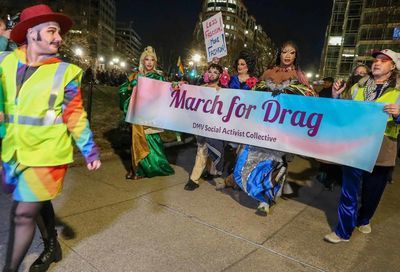Congress seeks to overturn D.C. reproductive rights bill
LGBT groups stand in solidarity with their allies in the women’s and civil rights movement against congressional interference

A coalition of organizations that advocate on behalf of LGBT rights and reproductive freedom blasted a decision by a congressional committee to continue with efforts aimed at overturning a recently passed D.C. law prohibiting discrimination based on one’s reproductive health decisions.
At a markup hearing of the U.S. House Committee on Oversight and Government Reform (OGR) on Tuesday, conservatives moved forward with a resolution of disapproval aimed at overturning the Reproductive Health Non-Discrimination Amendment Act (RHNDAA), which prohibits employers from discriminating or retaliating against employees, their spouses, and their dependents for decisions such as whether to use birth control, for example.
The coalition had previously mobilized to oppose another resolution of disapproval that had been aimed at overturning an amended version of the D.C. Human Rights Act that prohibits religiously-affiliated educational institutions from discriminating against LGBT students. So far, that legislation appears to have been dealt a reprieve, after OGR declined to schedule a hearing to mark up the resolution aiming to undo that bill.
Nonetheless, the coalition remained intact, with LGBT groups standing in solidarity with their fellow partners to oppose any congressional interference into D.C. matters, arguing, in the case of both D.C. laws, that religion cannot and should not be used as a justification for government-sanctioned discrimination.
“As leaders in movements for LGBT equality, reproductive freedom, and freedom of religion and belief, we stand shoulder-to-shoulder in opposition to efforts — at the state and federal level — to use religion to discriminate,” the coalition said in a joint statement. “We know all too well how people can be harmed when discrimination is allowed under the guise of religious liberty.
“Religious freedom is an important American value that guarantees all of us the freedom to hold any belief we choose, but it does not allow us to discriminate against and harm others,” the statement continued. “That is true with respect to businesses citing religious beliefs to refuse to serve people based on who they are or who they love. It is equally true when religion is invoked to deny women essential reproductive health care, or to discriminate against them for their private, personal health care decisions.”
The coalition reiterated its opposition to the resolutions of disapproval for both bills, even though — at least for the time being — the one aimed at overturning the amended Human Rights Act appears to have stalled.
“We stand together — and we will vigorously oppose every effort to allow religious claims to be used to discriminate and harm others,” the coalition’s statement concluded. Some of the 38 signatories to the statement include: the American Civil Liberties Union (ACLU), the Center for Reproductive Rights, the Human Rights Campaign (HRC), Lambda Legal, the National Black Justice Coalition (NBJC), the National Center for Lesbian Rights (NCLR), and the National Center for Transgender Equality (NCTE).
Both the ACLU and the D.C.-based Gay and Lesbian Activists Alliance (GLAA) decried Congress’ attempt to challenge District residents’ reproductive rights, stressing the importance of solidarity among a more socially liberal coalition of interest groups, as well as cautious optimism that Congress won’t reverse course and break its word by pursuing an overturn of the HRAA.
“At the end of the day, the House Oversight and Government Reform Committee still intends to act in a way that allows religion to be used to discriminate against D.C. residents for their private, personal health care decisions,” said Ian Thompson, legislative representative for the ACLU. “LGBT advocates are standing shoulder-to-shoulder with our reproductive rights partners in opposing this congressional overreach.”
“GLAA has been working to defend both of the congressionally targeted D.C. bills in alliance with groups from HRC, ACLU, and DC Vote to NARAL, Planned Parenthood, National Women’s Law Center, and Catholics for Choice,” GLAA President Richard J. Rosendall said. “We have seen one group’s rights traded for another’s before. Our coalition stands against those trade-offs. For me, this is not just a matter of principle, it is personal. I have four actual sisters, plus several nieces. I cannot subordinate their rights to mine, nor can I ask my lesbian friends to sort or prioritize their different traits. We all need to fight this, both on the merits of these two nondiscrimination bills and on the basis of self-determination for the citizens of the District of Columbia.”
D.C. Councilmember Anita Bonds (D-At-Large), one of the current Councilmembers who voted for both the original RHNDAA bill and a temporary bill clarifying the Council’s intent behind RHNDAA, as well as the original HRAA bill, struck a similar tone in her own remarks reacting to Congress’s decision to pursue the RHNDAA disapproval resolution.
“I call on the U.S. Congress to not discriminate against women in D.C. because of their reproductive health choices,” Bonds said. “Republican members of Congress should be more concerned with the lack of freedom and democracy of 650,000 Americans than they should with wedge issues that promote their candidacies in their home districts. Once again, this highlights the need for D.C. statehood.”
In statements at the markup hearing, Del. Eleanor Holmes Norton (D), the District’s non-voting representative in the U.S. Congress, lit into congressional Republicans pushing for the resolution of disapproval, the first that has gotten to the markup stage in the OGR committee in more than 20 years, since 1993.
“This markup makes no pretense at fairness,” Norton said in her opening statement. “The reason for Republicans’ action today boils down to their political disagreement with the District’s local law, their willingness to override their own local control principles, and above all, their subservience to the interest groups that are the prime movers for today’s markup.”
Norton also cited prior case law to bolster her argument that the RHNDAA law complies with how the courts have interpreted the First Amendment and the existing federal Religious Freedom Restoration Act (RFRA). She then called on her colleagues to reject the resolution of disapproval, which could still face an uphill climb, as it needs to pass both chambers of Congress and receive the signature of President Obama, who opposes efforts to restrict reproductive choice.
“My Republican colleagues will cite freedom of religion, which in this case would mean the freedom of any employer in the District of Columbia to discriminate against any employee because of the person, constitutionally-protected reproductive choices she makes in her private capacity, even though she is ready and willing to carry out her employer’s policies and practices on the job, whatever they are,” Norton said. “This is not freedom of religion. It is the freedom to discriminate. Fortunately our federal courts have never allowed employers to use their personal religious objections to hiring or firing employees, or there would be nothing left to the nation’s anti-discrimination laws.”
Support Metro Weekly’s Journalism
These are challenging times for news organizations. And yet it’s crucial we stay active and provide vital resources and information to both our local readers and the world. So won’t you please take a moment and consider supporting Metro Weekly with a membership? For as little as $5 a month, you can help ensure Metro Weekly magazine and MetroWeekly.com remain free, viable resources as we provide the best, most diverse, culturally-resonant LGBTQ coverage in both the D.C. region and around the world. Memberships come with exclusive perks and discounts, your own personal digital delivery of each week’s magazine (and an archive), access to our Member's Lounge when it launches this fall, and exclusive members-only items like Metro Weekly Membership Mugs and Tote Bags! Check out all our membership levels here and please join us today!
























You must be logged in to post a comment.